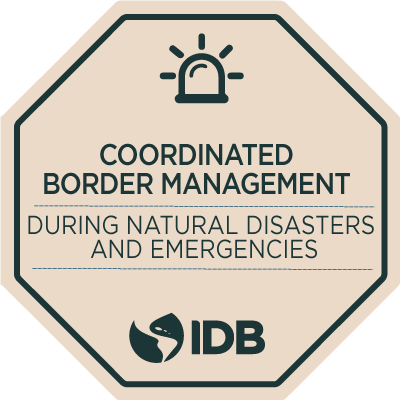Coordinated Border Management during Emergencies and Natural Disasters
Puede obtener esta insignia si completa con éxito el curso.
TIPO DE CURSO
SELF-PACED
FECHAS
-
PRÓXIMAS EDICIONES
2025 TBD
PRECIO
FREE
IDIOMA
Inglés
ESFUERZO
10 hours
SOBRE ESTE CURSO
This course contains tools to develop and strengthen contingency plans for customs and border agencies in the event of natural or provoked disasters. It also reviews the main responsibilities of the actors involved in emergency response, from a proactive, preventive and coordinated approach. In addition, international conventions and agreements for border management are addressed, which may favor the consolidation of a national legal framework, with the purpose of avoiding disruptions and interruptions in the flow of goods and people entering and leaving the country, and speeding up humanitarian aid operations.
AUDIENCIA DEL CURSO
This program is aimed at public and private sector officials and international organizations working on issues related to customs, border agencies, humanitarian aid, among others.
COSTOS Y REEMBOLSOS
Free of charge. The Inter-American Institute for Economic and Social Development (INDES), which belongs to the Inter-American Development Bank (IDB), has as its mission to contribute to the strengthening of knowledge and skills of strategic audiences in the region, necessary to promote the economic and social development of Latin America and the Caribbean. for this reason the tuition for this course is subsidized by IDB resources.
ESTRUCTURA DEL CURSO
In this module:
1. You will recognize the impact of a disaster on customs and border management in order to be prepared to effectively deal with a natural disaster, catastrophe or emergency.
2. Understand the effects and the negative impact of not having a contingency plan to provide continuity to border operations and the negative impact on supply chains to deal with the emergency and trade in general.
3. Identify the actors involved, as well as the importance of a proactive and efficient coordination among them during a natural disaster, catastrophe or emergency.
In this module:
1. You will learn about the international and regional tools and instruments that facilitate international humanitarian assistance operations.
2. You will identify the key national components that contribute to an efficient and effective response.
3. Identify the importance of having national legislation to facilitate the coordination of actors in emergency response.
4. Reflect on the importance of carrying out a self-assessment to strengthen the legal framework.
In this module:
1. You will understand the role and relationships of all the actors involved in the supply chain both nationally, regionally and internationally when dealing with a disaster or health emergency.
2. You will learn about the leadership of the customs administration and the support mechanisms that will be put in place with other agencies and government entities in close cooperation with the humanitarian community.
3. Recognize the need to provide for prioritized treatment of critical goods in the event of an emergency, and ensure a rapid return to normal management of the flow of goods.
In this module:
1. You will identify the need for improvements in communication and information generation before, during and after the emergency.
2. Relate the importance of digitization and automation as mechanisms to increase the efficiency of the supply chain.
3. Explain the importance of evaluation before and after emergencies and disasters for continuous improvement in response mechanisms and procedures.
PROGRAMAS RELACIONADOS
ÁREAS DE CONOCIMIENTO
COMPETENCIAS
